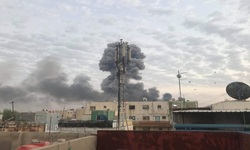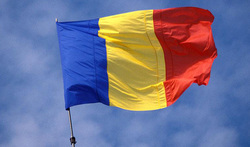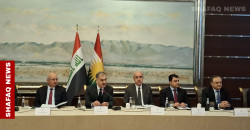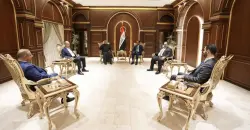Tension in Baghdad raises fear in Sunni Territories: "Regions" proposal resurge to mitigate PMF's growing hegemony
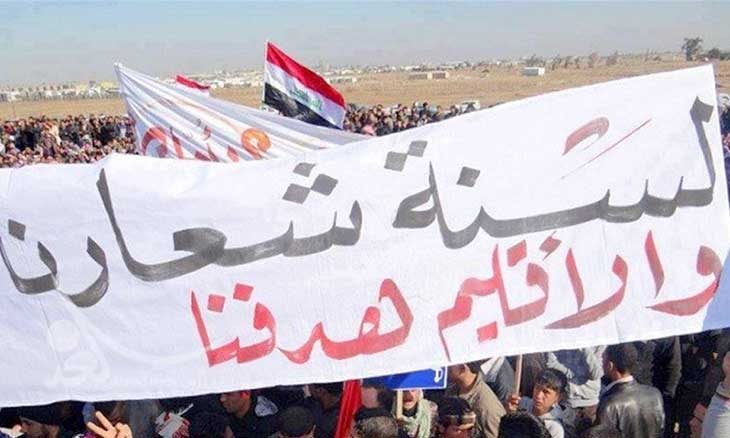
Shafaq News/ The recent security and political tensions in Baghdad, which have almost sparked a bloody conflict in the country, have resonated in predominantly Sunni territories, raising fears of an unknown future that could be saved by establishing regions.
Many Iraqi Sunni leaders have begun to reintroduce the "al-Anbar" or "Sunni" region project as a solution aimed at replicating the Kurdistan region's successful experience, which has contributed to the region's security, political, and economic superiority over the rest of Iraq.
Reviving such a proposition reflects Sunni fears that factions in al-Hashd al-Shaabi (Popular Mobilization Forces-PMF) will accumulate influence, rebel against the command of the country's armed forces, and even challenge them in broad daylight.
Tensions mounted in Iraq's capital after the arrest of PMF's Operations commander in al-Anbar on terrorism charges, prompting a dangerous showdown by the detainee's paramilitary supporters and the Iraqi government.
Some armed PMF factions gathered around the Green Zone's entrance gates and near PM al-Kadhimi's headquarters. Tensions reached a fever pitch when Iraqi security forces and the elite Counter-Terrorism Service were deployed to protect the government and diplomatic missions, sparking fears of violence.
The prime minister described the show of force as "a serious violation of the Iraqi constitution and the laws in force," adding in a statement, "we have directed an immediate investigation into these movements."
"I have found no justification for besieging the commander-in-chief of the armed forces' office by elements claiming to be linked to the commander-in-chief while offending the state with weapons, vehicles, and state salaries," said Ahmed Abu Risha, leader of "Sahwat Al-Iraq".
Abu Risha tweeted, "The partnership of governance has become impossible with these militias continuously infringing on Iraq's prestige."
He also thanked the Constitution Writing Committee, which drafted the territorial clause, "Because it is the solution to respect the country's components. The regions represent respect for the blood and the future of generations."
The Iraqi Constitution allows the establishment of territories in the country, similar to the Kurdistan region, as the country's system is federal.
Article 119 of the Iraqi Constitution states that each governorate or more has the right to form a region at the request of a referendum, which is submitted in two ways: a request submitted by either at least one-third of the local council or one-tenth of the voters in the governorates aiming to form a region.
"We are the first to launch the issue of regions. If we want to save al-Anbar, it is shameful to assign the same personalities accused of terrorist cases and external links," said Mustafa Al-Dulaimi, a member of the Iraqi Opposition Union.
Al-Dulaimi added, "As for our movements to establish al-Anbar region, there are many stages that must be completed before the implementation. The first of which is to send a message of reassurance to all neighboring countries, including Iran."
"From the countries that have reacted to this issue, Saudi Arabia, Jordan, Syria, and even Turkey. But after talking to these parties and informing them about our project, we cooperated positively and met with investment companies in these countries, and there are great understandings for this file. There is only one step left, and that will happen soon," Al-Dulaimi clarified.
He continued, "There are many axes to work on; figures within the governorate council must vote for the region, and the matter must also be voted for inside the parliament. Unfortunately, this is not available yet, as they are all members of political blocs and parties that do not care about the governorate's interests."
"For about ten days, we have been communicating with countries and organizations with strong influence so that they can oversee the public vote if it is conducted, including the United States, which is a key ally," Al-Dulaimi said.
Sunnis have complained of marginalization since the overthrow of the former Iraqi regime in 2003, and Shiite forces took power in the country.
Al-Hashd Al-Shaabi's factions, mostly Shiite, have tightened their grip on Sunni-majority areas in northern and western Iraq since the end of the war against ISIS in 2017, particularly the border areas with Syria, amid a discontent of those territories' residents.
"The leading Sunni political figures, from Parliament Speaker Mohammed Al-Halboosi to the smallest political figure, cannot face any influential militia in al-Anbar," Al-Dulaimi stated.
Sunni politicians view the establishment of a region as a lifeline that could allow them to manage their areas away from the PMF, whose the majority of its leaders are associated with Iran.
"Establishing regions is a right guaranteed by the Constitution. Six articles guarantee that right and elaborate how to do it. We have organized several conferences and submitted forms around it to the Commission since 2011 to transform the governorate into a region," said Kitab al-Meezan, a Conference member on the Establishment of Saladin Region.
Al-Meezan added, "We, the advocates of Regions' project, believe that Iraq is a federal country, i.e., provincial regions. We reject all calls for the formation of a Sunni region because it is sectarian, due to the diversity within these governorates."
"The procedures for forming the Saladin region began in 2011. The governorate council voted per article 116, the first and second paragraphs, by collecting the forms of one-tenth of the governorate's voters and submitting them to the Commission. The Nineveh Governorate Council also voted in 2012 and submitted the forms in 2017, and there was a press conference for the committee preparing for its formation. Even Diyala has voted since 2011 and conferences were organized two months ago, the Iraqi Institute for Federalism Support, which was organized by the governorate aiming to establish a region, including Basra, and al-Anbar began printing a form through which they will collect signatures and submit them to the Commission," he continued.
"Those governorates are convinced that there is no solution to the crisis, militias, and the bureaucracy of ministries except through forming regions. That does not mean separation from the state, as Baghdad will maintain its centrality and importance, but the formation of regions is for nothing but obtaining broader powers," al-Meezan concluded.
